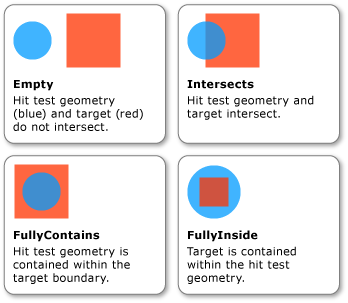GeometryHitTestParameters Class
Definition
Important
Some information relates to prerelease product that may be substantially modified before it’s released. Microsoft makes no warranties, express or implied, with respect to the information provided here.
Specifies a Geometry as the parameter to be used for hit testing a visual tree.
public ref class GeometryHitTestParameters : System::Windows::Media::HitTestParameterspublic class GeometryHitTestParameters : System.Windows.Media.HitTestParameterstype GeometryHitTestParameters = class
inherit HitTestParametersPublic Class GeometryHitTestParameters
Inherits HitTestParameters- Inheritance
Examples
The following example shows how to set up a hit test using GeometryHitTestParameters for the HitTest method. The Point value that is passed to the OnMouseDown method is used to create a Geometry object in order to expand the range of the hit test.
// Respond to the mouse button down event by setting up a hit test results callback.
private void OnMouseDown(object sender, MouseButtonEventArgs e)
{
// Retrieve the coordinate of the mouse position.
Point pt = e.GetPosition((UIElement)sender);
// Expand the hit test area by creating a geometry centered on the hit test point.
EllipseGeometry expandedHitTestArea = new EllipseGeometry(pt, 10.0, 10.0);
// Clear the contents of the list used for hit test results.
hitResultsList.Clear();
// Set up a callback to receive the hit test result enumeration.
VisualTreeHelper.HitTest(myControl, null,
new HitTestResultCallback(MyHitTestResultCallback),
new GeometryHitTestParameters(expandedHitTestArea));
// Perform actions on the hit test results list.
if (hitResultsList.Count > 0)
{
ProcessHitTestResultsList();
}
}
' Respond to the mouse button down event by setting up a hit test results callback.
Private Overloads Sub OnMouseDown(ByVal sender As Object, ByVal e As MouseButtonEventArgs)
' Retrieve the coordinate of the mouse position.
Dim pt As Point = e.GetPosition(CType(sender, UIElement))
' Expand the hit test area by creating a geometry centered on the hit test point.
Dim expandedHitTestArea As New EllipseGeometry(pt, 10.0, 10.0)
' Clear the contents of the list used for hit test results.
hitResultsList.Clear()
' Set up a callback to receive the hit test result enumeration.
VisualTreeHelper.HitTest(myControl, Nothing, New HitTestResultCallback(AddressOf MyHitTestResultCallback), New GeometryHitTestParameters(expandedHitTestArea))
' Perform actions on the hit test results list.
If hitResultsList.Count > 0 Then
ProcessHitTestResultsList()
End If
End Sub
The IntersectionDetail property of GeometryHitTestResult provides information about the results of a hit test that uses a Geometry as a hit test parameter. The following illustration shows the relationship between the hit test geometry (the blue circle) and the target object (the red square).

Intersection between hit test geometry and target object
Remarks
With the GeometryHitTestParameters class, you can use a Geometry value for hit testing, to determine whether any visual object intersects with the Geometry value.
You can also hit test with a Point value by creating a PointHitTestParameters object.
Note
Windows Presentation Foundation (WPF) hit testing only considers the filled area of a geometry during a hit test. If you create a point Geometry, the hit test would not intersect anything because a point has no area.
Constructors
| GeometryHitTestParameters(Geometry) |
Initializes a new instance of the GeometryHitTestParameters class, using the specified Geometry. |
Properties
| HitGeometry |
Gets the Geometry that defines the hit test geometry for this GeometryHitTestParameters instance. |
Methods
| Equals(Object) |
Determines whether the specified object is equal to the current object. (Inherited from Object) |
| GetHashCode() |
Serves as the default hash function. (Inherited from Object) |
| GetType() |
Gets the Type of the current instance. (Inherited from Object) |
| MemberwiseClone() |
Creates a shallow copy of the current Object. (Inherited from Object) |
| ToString() |
Returns a string that represents the current object. (Inherited from Object) |
